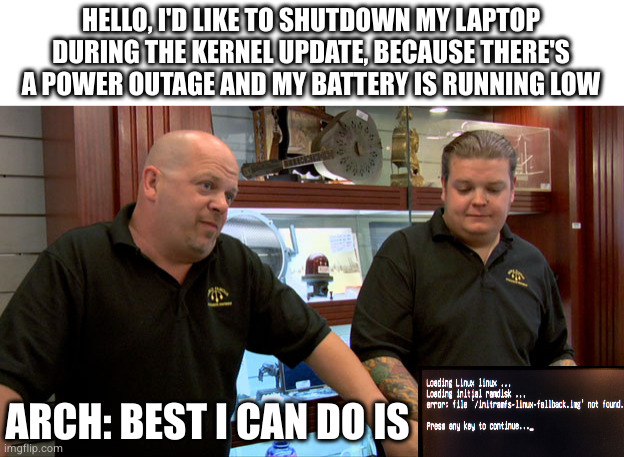this post was submitted on 04 Aug 2024
320 points (87.7% liked)
linuxmemes
30230 readers
1760 users here now
Hint: :q!
Sister communities:
Community rules (click to expand)
1. Follow the site-wide rules
- Instance-wide TOS: https://legal.lemmy.world/tos/
- Lemmy code of conduct: https://join-lemmy.org/docs/code_of_conduct.html
2. Be civil
- Understand the difference between a joke and an insult.
- Do not harrass or attack users for any reason. This includes using blanket terms, like "every user of thing".
- Don't get baited into back-and-forth insults. We are not animals.
- Leave remarks of "peasantry" to the PCMR community. If you dislike an OS/service/application, attack the thing you dislike, not the individuals who use it. Some people may not have a choice.
- Bigotry will not be tolerated.
3. Post Linux-related content
- Including Unix and BSD.
- Non-Linux content is acceptable as long as it makes a reference to Linux. For example, the poorly made mockery of
sudoin Windows. - No porn, no politics, no trolling or ragebaiting.
- Don't come looking for advice, this is not the right community.
4. No recent reposts
- Everybody uses Arch btw, can't quit Vim, <loves/tolerates/hates> systemd, and wants to interject for a moment. You can stop now.
5. 🇬🇧 Language/язык/Sprache
- This is primarily an English-speaking community. 🇬🇧🇦🇺🇺🇸
- Comments written in other languages are allowed.
- The substance of a post should be comprehensible for people who only speak English.
- Titles and post bodies written in other languages will be allowed, but only as long as the above rule is observed.
6. (NEW!) Regarding public figures
We all have our opinions, and certain public figures can be divisive. Keep in mind that this is a community for memes and light-hearted fun, not for airing grievances or leveling accusations. - Keep discussions polite and free of disparagement.
- We are never in possession of all of the facts. Defamatory comments will not be tolerated.
- Discussions that get too heated will be locked and offending comments removed.
Please report posts and comments that break these rules!
Important: never execute code or follow advice that you don't understand or can't verify, especially here. The word of the day is credibility. This is a meme community -- even the most helpful comments might just be shitposts that can damage your system. Be aware, be smart, don't remove France.
founded 2 years ago
MODERATORS
you are viewing a single comment's thread
view the rest of the comments
view the rest of the comments

It first downloads all packages from net, then it proceed totally offline starting by verifying downloaded files, signatures, extracting new packages and finally rebuilding initramfs.
Because arch is replacing the kernel and inittamfs in-place there is a chance that it will not boot if interrupted.
This issue was long resolved on other distro.
One way to mitigate it is by having multiple kernels (like LTS or hardened) that you can always pick in grub if the main one fail.
This issue was solved on Slackware in 1993.
It installs a "huge" kernel that contains all drivers to run on almost any hardware by default, alongside the "generic" kernel with only the modules you need. If the generic kernel fails to boot, you always have the backup, which is known to work, cause it's the kernel you first boot into after installation.
I'm not familiar with slackware but why is specific kernel called generic, while generic one is not called generic? I'm puzzled
I have no idea either.
Edit: Did some reading. "Linux-generic" is just the name of the linux kernel that is used in most computers (as opposed to Linux-realtime, which is the only other Linux kernel that's still relevant).
Yeah but how can you download without internet
(No internet =} no download = no failure
You can even host repo mirror locally, that will still work without internet ;)
How to have internet without power?